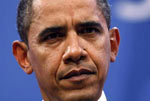 The Hill: The Obama administration’s narrative on Iraq this week produced—intentionally or not—two strategic mistakes regarding the U.S. posture on Iran and the current ongoing conflict in Iraq. The first error was when the Pentagon’s spokesperson stated that “no Iranian regular forces” are operating inside Iraq, while admitting that “regime forces” are deployed and engaged in operations. Those comments are contradictory.
The Hill: The Obama administration’s narrative on Iraq this week produced—intentionally or not—two strategic mistakes regarding the U.S. posture on Iran and the current ongoing conflict in Iraq. The first error was when the Pentagon’s spokesperson stated that “no Iranian regular forces” are operating inside Iraq, while admitting that “regime forces” are deployed and engaged in operations. Those comments are contradictory.
The Hill
By Walid Phares
 The Obama administration’s narrative on Iraq this week produced—intentionally or not—two strategic mistakes regarding the U.S. posture on Iran and the current ongoing conflict in Iraq.
The Obama administration’s narrative on Iraq this week produced—intentionally or not—two strategic mistakes regarding the U.S. posture on Iran and the current ongoing conflict in Iraq.
The first error was when the Pentagon’s spokesperson stated that “no Iranian regular forces” are operating inside Iraq, while admitting that “regime forces” are deployed and engaged in operations. Those comments are contradictory.
The second mistake was to acknowledge the legitimacy of having Iranian forces intervene inside Iraq against the forces in opposition to the Maliki government—because some of these forces are part of the Jihadi network. The U.S. is giving a pro-Iranian government in Baghdad the right to seek military intervention by their protectors in Tehran.
On July 8, 2014, Pentagon Press Secretary Navy Rear Adm. John Kirby said during a news conference: “There are no indications that Iran has regular military forces on the ground inside Iraq.” He added: “We know that there are some Iranian operatives—Quds Force operatives—inside Iraq that are training and advising some Iraqi security forces but more critically Shia militia. And we also know that Iran has flowed in some supplies, arms and ammunition and even some aircraft for Iraq’s armed forces.”
Yet both of these forces are regular armies of the regime, and both are under the authority of the Supreme Leader Ayatollah Khameini. The Quds force, as the admiral stated in his press conference, “is a special branch of Iran’s Revolutionary Guard, responsible for operations outside of Iran.” The Quds force is a division of the regime’s military, and thus when it acts on foreign soil, it constitutes Iranian military action outside the borders of the Islamic Republic.
And those in Washington must, apparently, be reminded that the Quds force is on our list of terrorist organizations. Even if this terror entity is fighting another terror organization, even al Qaeda or ISIS, this does not change its terror designation – and the same can be said when Hezbollah fights al Qaeda or al Qaeda fights ISIS. They are all still terrorist organizations and fighting amongst themselves does not alter that.
The U.S. administration should not legitimize the militant activities by a terror group under these or any circumstances.
Shockingly, the Pentagon narrative went so far as to state that, “Iraq has the right to reach out to its neighbors for support,” indirectly legitimizing Iranian intervention in Iraq. This unprecedented statement goes against a U.S. posture to interdict Iran’s meddling in Iraq since 2003 while also breaching U.S. counterterrorism guidelines regarding the terror group designation of the Quds force.
We are talking about a major shift by the Obama administration to quasi-officially recognize Tehran’s military role inside Iraq, confirming the argument made in my latest book, The Lost Spring, that Washington has transferred influence to Iran after its withdrawal from Iraq at the end of 2011.
The Iranians have taken full advantage of the weakened U.S. posture over the past three years by immediately inserting the Quds force inside Iraq, by backing Malaki’s government suppression of traditional Sunni politicians, by using Iraq—with U.S. admission—to transfer assets to Syria, and last but not least, to destroy the exiled Iranian opposition inside Iraq, particularly in Camp Ashraf and Camp Liberty.
In Washington, the Iranian military factor in Iraq has almost vanished from national security assessment. Kirby noted that the United States is “dividing U.S. forces between two missions: diplomatic security and assessment of the cohesiveness of Iraqi security forces.” According to Kirby, about 640 troops are divided between the two missions, and the assessment mission includes six teams, based mostly in and around Baghdad, and two joint operations centers—one in Baghdad and one in Irbil.
The question is: how does the Administration perceive the threat in Iraq? Is it solely ISIS or is it Iran’s involvement as well? From these latest statements, it appears that Washington is committing in Iraq a mistake converse yet eerily similar to the mistake it committed in Syria – where by backing the ‘rebels’ who opposed the Assad regime without distinguishing them from the Jihadists, the Administration cleared the path for al Qaeda and ISIS to rise in Syria. And now, by welcoming into the fold all supporters of the Maliki regime combatting ISIS, the Administration is clearing the path for Iranian terrorist militias the flourish in Iraq.
Phares is the author of The Lost Spring: US Policy in the Middle East and Catastrophes to Avoid. He is co-secretary general of the Transatlantic Parliamentary Group on Counter Terrorism.


